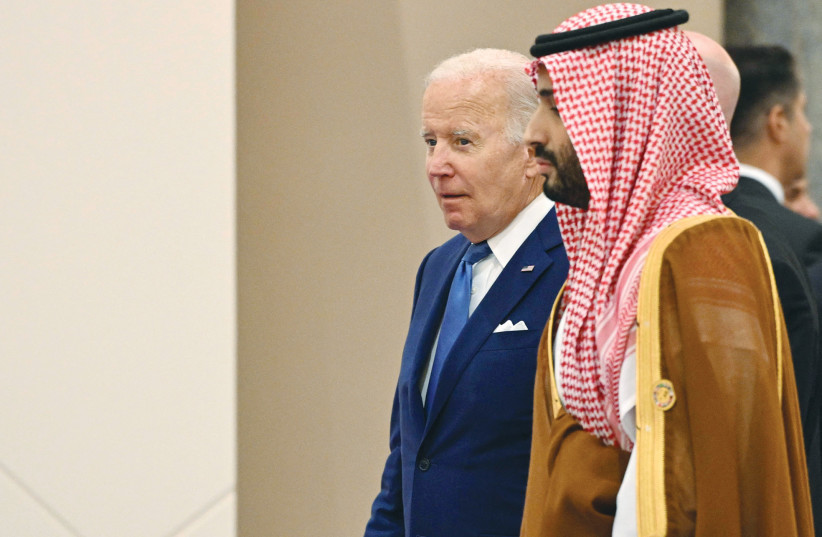Defense Minister Yoav Gallant on Wednesday met with top US diplomatic officials to encourage progress in widening the normalization wave with Sunni countries, including Saudi Arabia. He also emphasized the need to maintain Israel’s qualitative military superiority.
Gallant delivered a document that was drafted by officials in the defense establishment to clarify the exact details of what kind of nuclear program the US might offer the Saudis and how it would prevent such a civilian nuclear program from evolving into a military one.
Gallant met with US National Security Council Coordinator for the Middle East and North Africa Brett McGurk, US Assistant Secretary of State for Near Eastern Affairs Barbara Leaf, and US Ambassador to the UN Linda Thomas-Greenfield.
He thanked McGurk for his continuous efforts to advance normalization with Arab countries in the region – diplomatic code for Saudi Arabia, which is Washington’s and Jerusalem’s current top normalization target.
The US side appeared to take the document and the questions seriously, promising substantive answers without significant delay, knowing that experts in the Israeli defense establishment could heavily impact Israel’s final stance on the Saudi nuclear issue.

Maintaining Israel’s qualitative military advantage usually refers to having more advanced aircraft, defensive systems, and advantages with any unconventional weapons, such as nuclear weapons (which Israel reportedly has), and which the Saudis and others are seeking to receive from the US in normalization negotiations.
Currently, only Israel has the F-35 fighter jet, but Riyadh also wants advanced aircraft. Previously, the US was due to sell F-35 aircraft to the UAE, although for reasons unrelated to Israel, that transaction has been indefinitely frozen.
Most notably, the Saudis have demanded a nuclear reactor and the ability to enrich uranium locally for solely civilian purposes.
While Riyadh has promised not to move beyond such civilian purposes, there are mixed views within Israel about the Saudis receiving such a capability, which could conceivably be converted to a military nuclear program.
Generally, the idea is that although Israel is small in territory and in its standing army, it can use higher quality weapons systems to deter its enemies from many kinds of broad attacks.
Iran behind West Bank escalation
Gallant also described the IDF’s efforts to combat terrorism in the West Bank, including highlighting Iran’s role in the ongoing battle. He detailed Iranian support for terrorism in the region, including the transfer of funds and arms.
The IDF would continue to fight hard against terrorism, while trying to maintain a higher quality of life for Palestinian areas that were uninvolved in terrorist attacks, Gallant said.
For unclear reasons, Gallant did not plan to meet with US Secretary of Defense Lloyd Austin, even though such a meeting is usually a standard stop for an Israeli defense minister. They have met multiple times, including in Brussels in June, and are said to be in regular touch by phone and through their respective teams.
There was no mention of Iran’s nuclear program in the press releases issued by Gallant, but he did hold additional national security meetings where other issues related to Iran were raised.
On Tuesday, Gallant was at the UN to campaign for Israel’s position that UNIFIL more actively enforce its UN Resolution 1701 mandate of maintaining peace on the border between Hezbollah and Israel.
